For many boaters, a marine battery weight is an important consideration, as it can affect the boat’s performance, especially for kayaks, sailboats, and other small boats. But how much does a marine battery weigh? It’s more than just a number, and depends on several factors, including the battery type, size, capacity, and application.
In this article, we’ll explore the importance of deep cycle marine battery weight, break down the key factors that influence battery weight and answer all your questions about 12V marine batteries.
Table of Content
- How Battery Weight Affects Boat Performance?
- How Much Does a 12V Marine Battery Weigh?
- What’s the Lightest Marine Battery?
- Battery Weight by Purpose: Starting vs. Deep Cycle Marine Battery
- Battery Weight by Group size: Group 24 vs. 27 vs. 31 vs. 8D
- Battery Weight by Capacity: 50Ah vs. 100Ah vs. 140Ah+
- Battery Weight by Application: Marine, RV, and Solar
- FAQ about 12V Marine Battery
How Battery Weight Affects Boat Performance?
Battery weight directly influences marine performance. For smaller boats, a lighter battery, such as the lightweight marine battery options, can boost speed, maneuverability, and fuel efficiency, making the boat easier to navigate and control. On the other hand, excessive battery weight raises the boat’s center of gravity, increasing the risk of tipping and reducing stability, which can pose safety concerns.
For larger boats, while they may handle heavier batteries more effectively, excess weight still impacts performance. It can decrease engine efficiency, requiring more fuel to sustain speed and slowing acceleration. This is especially crucial for boaters aiming to optimize their vessel’s performance for long voyages or competitive events.
By selecting the right battery weight, boaters can improve handling, boost speed, and enhance overall performance on the water.
How Much Does a 12V Marine Battery Weigh?
The weight of a 12V marine battery can vary significantly based on its type and capacity.
- Flooded Lead-Acid: Standard FLA batteries typically weigh between 30 to 60 lbs (13.6 to 27.2 kg) for a capacity of around 100 Ah.
- AGM: Absorbent Glass Mat (AGM) batteries are generally lighter than flooded batteries, weighing around 40 to 70 lbs (18.1 to 31.8 kg) for similar capacities.
- Gel: Gel batteries generally weigh between 40 to 60 lbs (18.1 to 27.2 kg) for a capacity of around 100 Ah, slightly lighter than AGM.
- Lithium LiFePO4: Lithium marine batteries are much lighter, typically weighing between 20 to 30 lbs (9.1 to 18.1 kg) for a capacity of 100 Ah.
| Battery Type | Average Weight (12V 100Ah) |
|---|---|
| Lead-Acid | 30–60 lbs |
| AGM | 40–70 lbs |
| Gel | 40–60 lbs |
| LiFePO4 (Lithium) | 20–30 lbs |
With lightweight materials and more compact cell structures, lithium LiFePO4 models are significantly lighter while offering the same or greater usable capacity. If reducing weight is a priority, whether for performance or ease of transport, lithium is the clear winner, especially in multiple batteries.
Tips: Always check the specifications from the manufacturer for the exact weight of the battery you are considering.
What’s the Lightest Marine Battery?
If you're looking to reduce weight on your boat without compromising power, lithium batteries are the top choice. Redodo’s lightweight kayak lithium options offer both portability and reliability.
One of the best ultra-light options is the 12V 50Ah trolling motor battery. It weighs just 11.27 lbs, making it ideal for kayaks, canoes, or small fishing boats. Despite its compact size, it delivers steady power for trolling motors, fish finders, and other small electronics. Additionally, the upgraded Bluetooth monitoring allows users check the battery capacity and voltage in real time.
Another excellent option is the Redodo 12V 100Ah Mini lithium battery, weighing only 19.84 lbs. This battery offers the same capacity as standard 100Ah models but in a much smaller and lighter package. It’s ideal for mid-size boats and trolling motors up to 70 lbs thrust.
Battery Weight by Purpose: Starting vs. Deep Cycle Marine Battery
Another factor that affects marine battery weight is the purpose: starting and deep cycle.
Marine starting batteries are designed to deliver a burst of energy to start your engine and then quickly recharge. They typically use thinner internal plates and don’t store as much energy, so they tend to be lighter.
Deep cycle marine batteries, on the other hand, are built for long, steady energy output. They have thicker plates and higher energy storage, which usually makes them heavier.
- Starting Batteries: Usually weigh 10–20% less than deep cycle marine batteries of the same size because they use thinner plates.
- Deep Cycle Batteries: Heavier but provide more usable energy and deeper discharges.
Redodo 12V Lithium Marine Starting Battery, weighs only 9.6 lbs
Battery Weight by Group size: Group 24 vs. 27 vs. 31 vs. 8D
Battery group sizes, such as Group 24, 27, or 31, refer to the physical dimensions and general power range of a marine battery. The larger the group size, the more capacity it typically offers, and the more it weighs.
Group 24 batteries are commonly used in small to mid-sized boats. They usually weigh around 45 to 50 lbs for lead-acid. Group 27 and 31 batteries are more powerful but can weigh up to 70 lbs or more in lead-acid form.
With lithium batteries, you get a major weight advantage. For example, a Group 24 lithium battery weighs only 22 to 25 lbs.
| Group Size | Lead-Acid Weight | Lithium Weight |
|---|---|---|
| Group 24 | 45–50 lbs | 22–25 lbs |
| Group 27 | 55–60 lbs | 26–28 lbs |
| Group 31 | 60–70 lbs | 29–33 lbs |
| Group 8D | 130–150 lbs | 60–70 lbs |
Battery Weight by Capacity: 50Ah vs. 100Ah vs. 140Ah+
Battery weight increases as capacity goes up, but lithium batteries still maintain a significant advantage in weight savings.
For example, The Redodo 12V 100Ah LiFePO4 battery offers full 100Ah capacity at just about 22 lbs, while a lead-acid version at the same capacity weighs 65 lbs.
As your capacity needs grow, especially on larger boats, Redodo offers high-capacity options like the 140Ah (29.7 lbs), 165Ah (33.6 lbs), 200Ah (48.5 lbs), and 300Ah (59.5 lbs). These are perfect for larger boats powering electronics, trolling motors, lights, ham radios, and more.
| Capacity | Lead-Acid Weight | Redodo Lithium Weight |
|---|---|---|
| 50Ah | 35–40 lbs | 11.57 lbs (Redodo 12V 50Ah) |
| 100Ah | 60–70 lbs | 19 lbs (Redodo 12V 100Ah Mini) |
| 140Ah | 80–90 lbs | 29.7 lbs (Redodo 12V 140Ah) |
| 165Ah | 90–100 lbs | 33.6 lbs (Redodo 12V 165Ah) |
| 200Ah | 120+ lbs | 48.5 lbs (Redodo 12V 200Ah) |
| 300Ah | 160+ lbs | 59.5 lbs (Redodo 12V 300Ah) |
Battery Weight by Application: Marine, RV, and Solar
If you're familiar with RV campers or solar energy systems, you may be wondering if marine batteries differ in weight. The answer: not by much, especially when you're using lithium batteries.
12V lithium batteries for deep-cycle use are versatile and suitable for all three applications—marine, RV, and solar. What makes marine batteries unique may be the need for vibration-resistant internal structures, enhanced protection against moisture, vibration, and salt exposure.
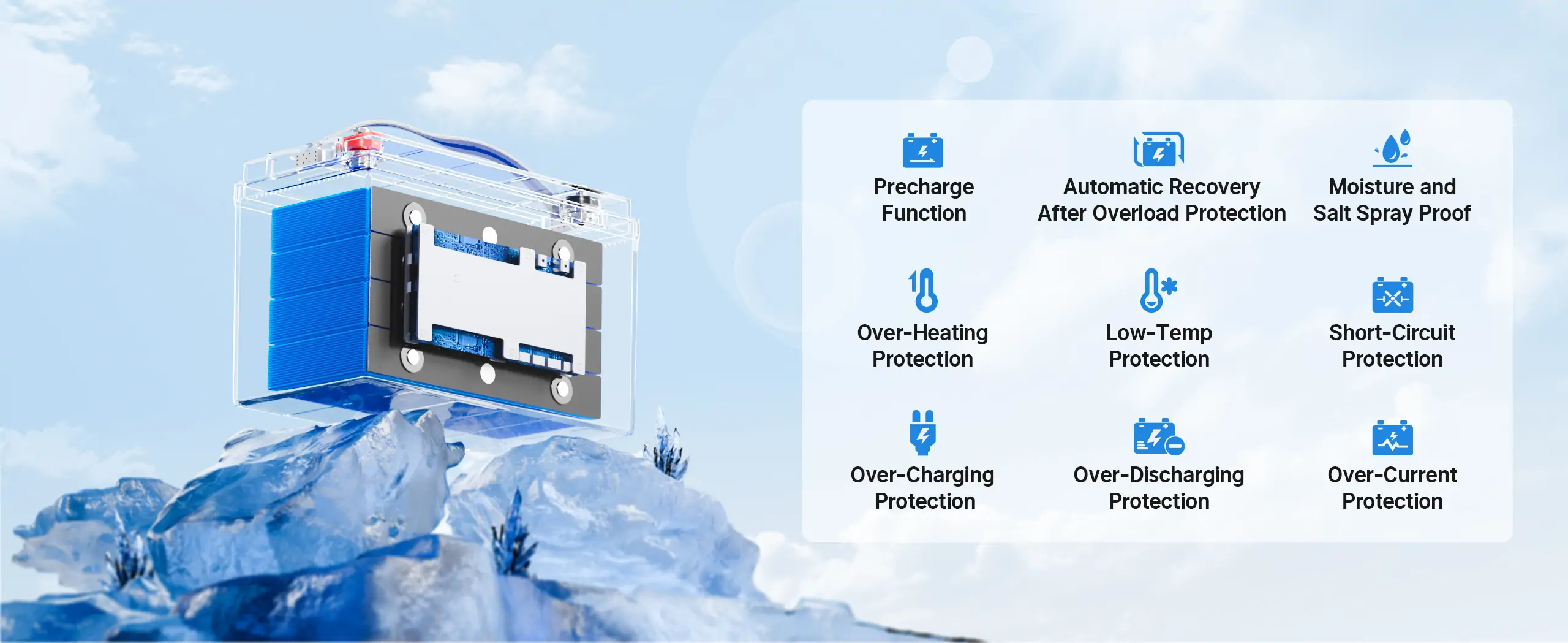
Conclusion
To sum up, knowing how much a 12V marine battery weighs plays a key role in maximizing your boat’s performance and energy efficiency. While lead-acid batteries have traditionally been the go-to choice, the growing preference for lightweight and high-efficiency lithium options is transforming the way boats are powered.
Redodo provides a wide range of high-performance 12 volt lithium batteries for marine. With a well-informed choice, you can find the best deep cycle boat battery that not only fits your current needs but also enhances your overall boating experience for the long haul.
FAQ about 12V Marine Battery
Are all marine batteries 12V?
No. While 12V marine batteries are the most common, especially for trolling motors and electronics, some larger boat systems use 24V or 36V configurations by connecting multiple 12V batteries in series or using an individual 24V/36V battery.
How long does a 12V marine battery last?
Lead-acid batteries typically last 2–4 years. Lithium batteries, like Redodo’s, can last over 10 years or 4000+ cycles with proper care.
Is it better to have a heavier battery or a lighter one for boats?
In general, a lighter battery is typically better—as long as it delivers enough capacity. Lithium batteries offer high energy density, meaning you get more power with less weight, which is better for performance and efficiency.
Read More:
6 Best Marine Battery for Your Boats
Best Lightweight Trolling Motor Batteries in 2025
How Fast Will a Kayak Go With a Trolling Motor?

Redodo

Redodo
Recent Post

What Does a 12V Battery for Boat Weigh?

How Long Will a 12V 100Ah Lithium Battery Last?

6 Best Lightweight Trolling Motor Batteries in 2025

How Long Does a Trolling Motor Battery Last?

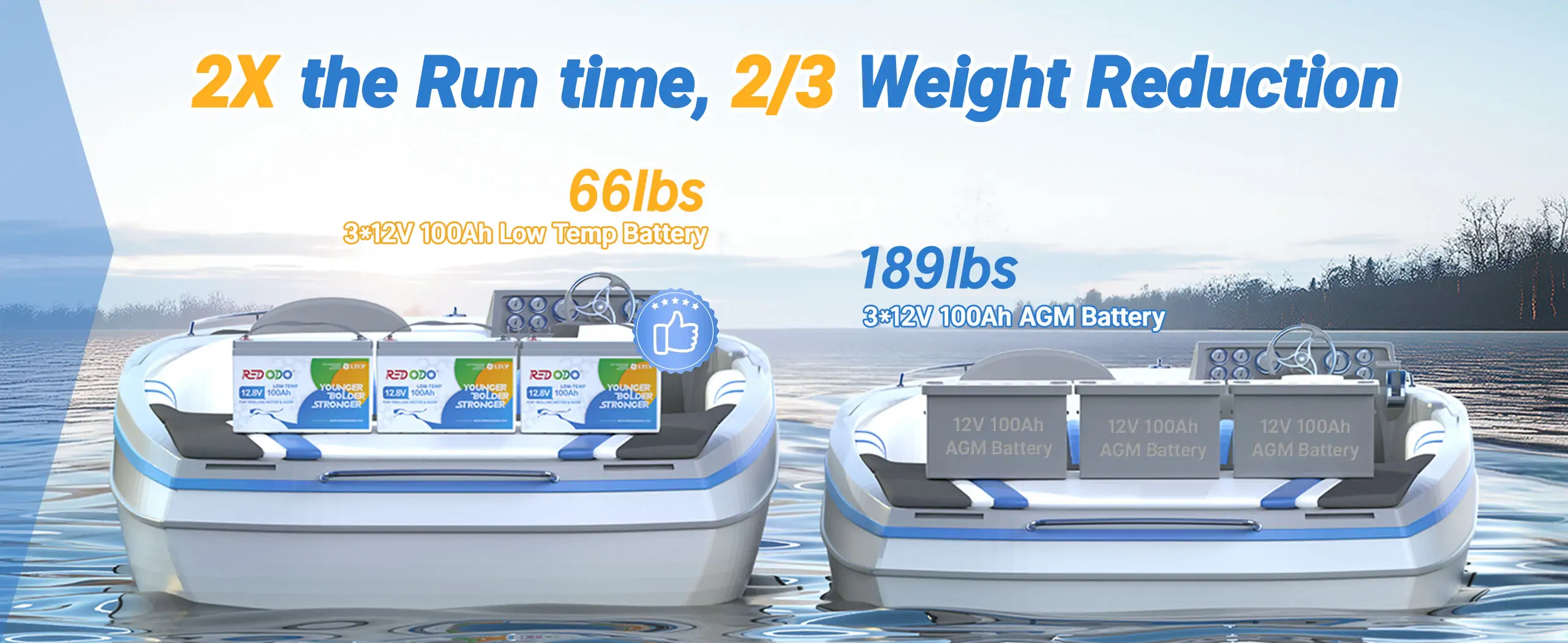
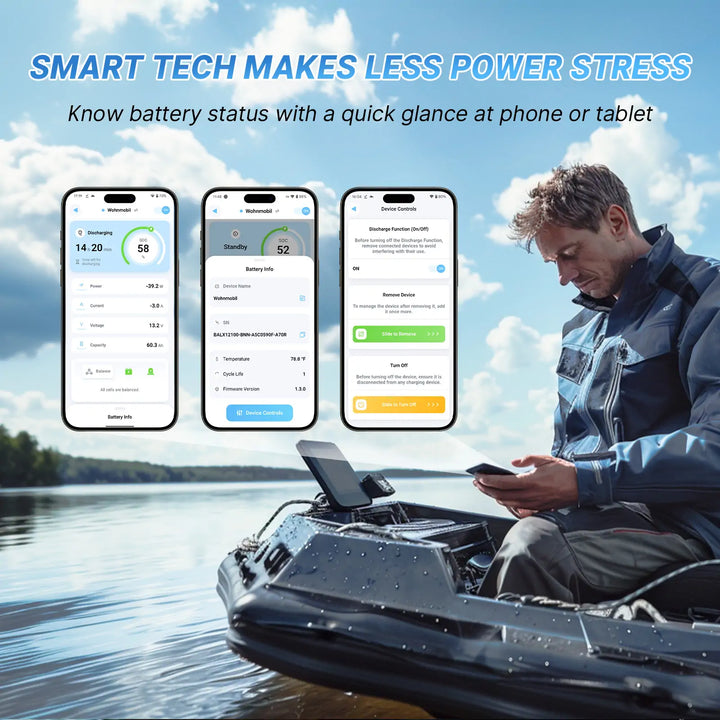

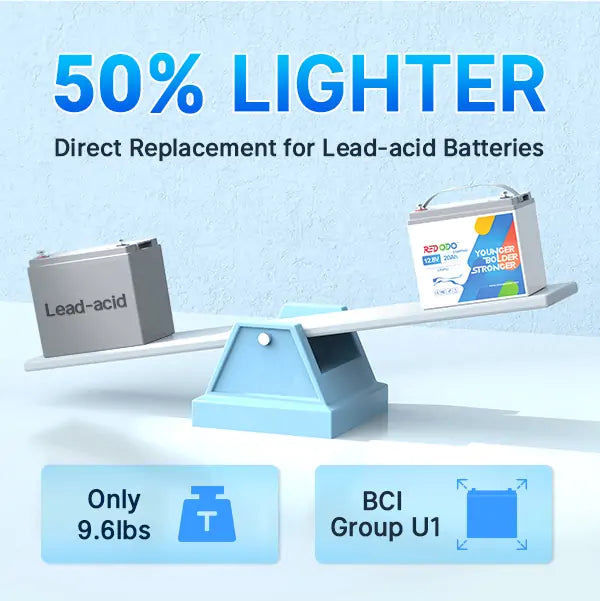


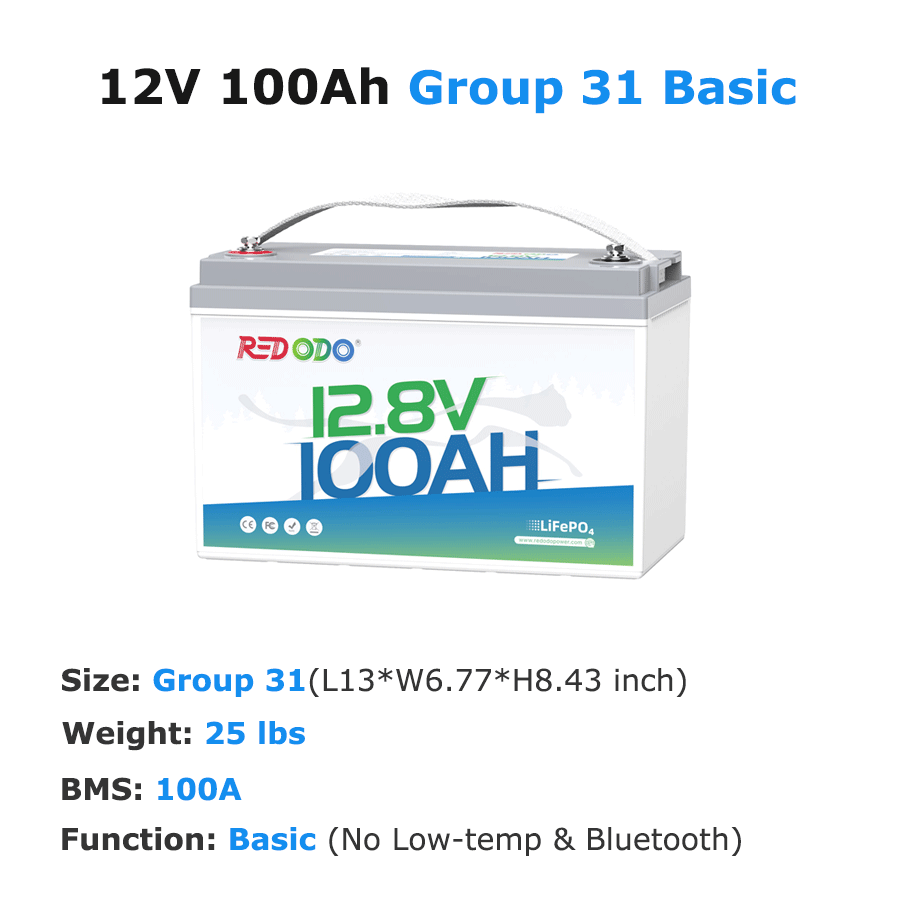
![⚡[$220 after Sign-Up] Redodo 12V 100Ah Mini Lithium LiFePO4 Battery | Smallest Battery | For RV, Trolling Motor, Solar](http://www.redodopower.com/cdn/shop/files/Redodo12V100AhMiniLiFePO4LithiumBattery.jpg?v=1739959054)



![⚡[$220 after Sign-Up] Redodo 12V 100Ah Group 24 Deep Cycle LiFePO4 Lithium Battery | For Home, RV, Marine](http://www.redodopower.com/cdn/shop/files/Redodo_12V_100Ah_group_24_lithium_battery_6301965d-f6e8-467f-825f-3eec839b3e1f.jpg?v=1744105344)
![⚡[$220 after Sign-Up] Redodo 12V 100Ah Group 31 Bluetooth Lithium Battery | Real-Time Battery Monitoring | For RV, Marine, Solar](http://www.redodopower.com/cdn/shop/files/Redodo_12V_100ah_group31_bluetooth_lithium_battery.jpg?v=1745565708)
![⚡[$220 after Sign-Up] Redodo 12V 100Ah LiFePO4 Lithium Battery | Best Budget | For RV, Solar, Trolling Motor](http://www.redodopower.com/cdn/shop/files/Redodo_12v_100ah_lithium_battery_b9015ddd-64b5-4be2-8c88-392f0bb4ab30.jpg?v=1742973160)
![⚡[$220 after Sign-Up] Redodo 12V 100Ah Lithium Trolling Motor Battery With Low Temp Protection](http://www.redodopower.com/cdn/shop/files/Redodo12V100Ahlow-tempbattery.webp?v=1738462317)
![⚡[$294 after Sign-Up] Redodo 12V 140Ah Group 31 Lithium Battery with Bluetooth | 40% More Capacity | For RV, Marine, Solar Home](http://www.redodopower.com/cdn/shop/files/Redodo_12V_140ah_bluetooth_battery_ee6d5fd1-5c7d-4b9a-90ab-d54d06b29a04.jpg?v=1742967763)